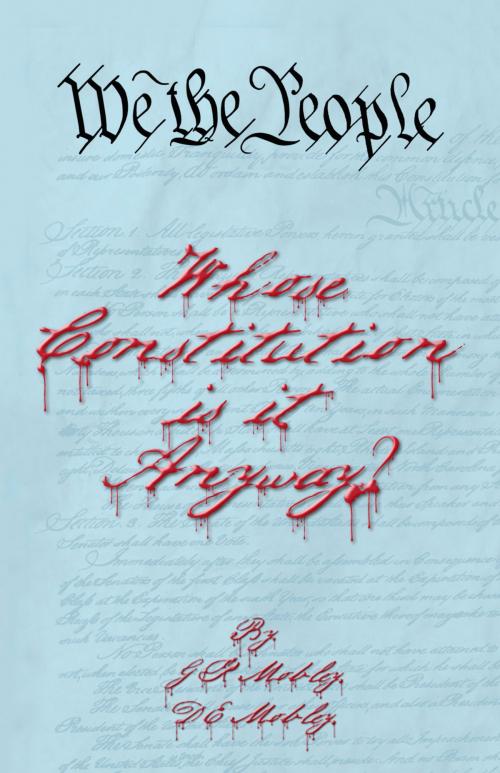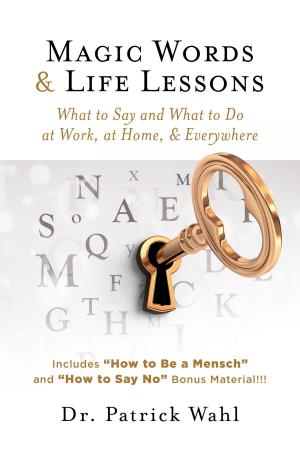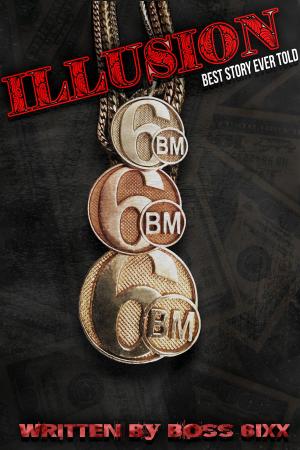We the People: Whose Constitution is it Anyway?
The Constitutional Fix to a Constitutional Problem
Nonfiction, History, Americas, United States| Author: | G. R. Mobley, D. E. Mobley | ISBN: | 9781626757202 |
| Publisher: | BookBaby | Publication: | April 24, 2013 |
| Imprint: | Language: | English |
| Author: | G. R. Mobley, D. E. Mobley |
| ISBN: | 9781626757202 |
| Publisher: | BookBaby |
| Publication: | April 24, 2013 |
| Imprint: | |
| Language: | English |
"We the People: Whose Constitution is it Anyway" provides hope for America and asserts that within the Constitution lays the fix for a renewed Constitutional Republic. No longer do enough Americans question the roles, responsibilities, powers, and actions of the Federal government. Consequently, "We the People: Whose Constitution is it Anyway" fills the many voids for today’s Libertarians; it calls upon Republicans and all good Patriots to realign with “republican or founding” principles and calls out the secular progressive for their failed communist ideologies, which are destroying America. Methodically, "We the People: Whose Constitution is it Anyway" builds the case that under the nose of the American public, the secular progressives within the Federal Government has erected a national church based upon their ideologies and that these ideologies have been inculcated into the American culture as main stream thought for several decades. "We the People: Whose Constitution is it Anyway" is a catalyst to promote constitutional orthodoxy and will be the greatest threat to secular progressive ideologies. Obama, other politicians, and pundits were right! Washington cannot be changed from within. "We the People: Whose Constitution is it Anyway" challenges Bill O'Reilly, Glenn Beck, Sean Hannity, and the many other purveyors of political commentary to step beyond their paradigm and national stage for America’s sake; and lead the call for States to coalesce again for a Constitutional Convention. As James Madison stated in Federalist Paper #49 February 5th 1788 Method of Guarding Against the Encroachments of Any One Department of Government by Appealing to the People Through a Convention: “As the people are the only legitimate fountain of power, and it is from them that the constitutional charter, under which the several branches of government hold their power, is derived, it seems strictly consonant to the republican theory, to recur to the same original authority... mere declarations in the written constitution are not sufficient to restrain the several departments within their legal rights.” Madison clearly argued the need for the Republic to return to Constitutional Conventions when our Federal Government steps beyond its enumerated boundaries. However, "We the People: Whose Constitution is it Anyway" asserts there is no need to send delegates and assemble in a central location for what could become a target of opportunity for enemies to undermine or attack the Republic. Brilliantly, "We the People: Whose Constitution is it Anyway" pushes the conventional roles of a Republic into twenty-first century technology to return more controls back to the States and the people. "We the People: Whose Constitution is it Anyway" is a play book for Patriots to organize and transform grass root organizations like the Tea Party into a formidable movement of individual liberty and sovereignty. Too often politicians and conservatives use rhetoric to call for a return to Constitutional government, unfortunately those who state this commonly do not understand what this means, nor do they understand exactly how far the federal government has drifted. This is why "We the People: Whose Constitution is it Anyway" moves into what is now considered the forgotten creation and ratification of the Constitution, applying a different context than what is taught today in the American school system and in the edifices of politics. Consequently, "We the People: Whose Constitution is it Anyway" translates the founding of the Republic into a simple and easy to grasp concept. Only the lawyers and politicians want government to take on the facade of complexity to keep the “people” from being “the only legitimate fountain of power”. Taking readers beyond the distractions of the main stream media and even conservative bastions of thought, and demonstrates just how limited the Federal government really is within the existing American Constitution.
"We the People: Whose Constitution is it Anyway" provides hope for America and asserts that within the Constitution lays the fix for a renewed Constitutional Republic. No longer do enough Americans question the roles, responsibilities, powers, and actions of the Federal government. Consequently, "We the People: Whose Constitution is it Anyway" fills the many voids for today’s Libertarians; it calls upon Republicans and all good Patriots to realign with “republican or founding” principles and calls out the secular progressive for their failed communist ideologies, which are destroying America. Methodically, "We the People: Whose Constitution is it Anyway" builds the case that under the nose of the American public, the secular progressives within the Federal Government has erected a national church based upon their ideologies and that these ideologies have been inculcated into the American culture as main stream thought for several decades. "We the People: Whose Constitution is it Anyway" is a catalyst to promote constitutional orthodoxy and will be the greatest threat to secular progressive ideologies. Obama, other politicians, and pundits were right! Washington cannot be changed from within. "We the People: Whose Constitution is it Anyway" challenges Bill O'Reilly, Glenn Beck, Sean Hannity, and the many other purveyors of political commentary to step beyond their paradigm and national stage for America’s sake; and lead the call for States to coalesce again for a Constitutional Convention. As James Madison stated in Federalist Paper #49 February 5th 1788 Method of Guarding Against the Encroachments of Any One Department of Government by Appealing to the People Through a Convention: “As the people are the only legitimate fountain of power, and it is from them that the constitutional charter, under which the several branches of government hold their power, is derived, it seems strictly consonant to the republican theory, to recur to the same original authority... mere declarations in the written constitution are not sufficient to restrain the several departments within their legal rights.” Madison clearly argued the need for the Republic to return to Constitutional Conventions when our Federal Government steps beyond its enumerated boundaries. However, "We the People: Whose Constitution is it Anyway" asserts there is no need to send delegates and assemble in a central location for what could become a target of opportunity for enemies to undermine or attack the Republic. Brilliantly, "We the People: Whose Constitution is it Anyway" pushes the conventional roles of a Republic into twenty-first century technology to return more controls back to the States and the people. "We the People: Whose Constitution is it Anyway" is a play book for Patriots to organize and transform grass root organizations like the Tea Party into a formidable movement of individual liberty and sovereignty. Too often politicians and conservatives use rhetoric to call for a return to Constitutional government, unfortunately those who state this commonly do not understand what this means, nor do they understand exactly how far the federal government has drifted. This is why "We the People: Whose Constitution is it Anyway" moves into what is now considered the forgotten creation and ratification of the Constitution, applying a different context than what is taught today in the American school system and in the edifices of politics. Consequently, "We the People: Whose Constitution is it Anyway" translates the founding of the Republic into a simple and easy to grasp concept. Only the lawyers and politicians want government to take on the facade of complexity to keep the “people” from being “the only legitimate fountain of power”. Taking readers beyond the distractions of the main stream media and even conservative bastions of thought, and demonstrates just how limited the Federal government really is within the existing American Constitution.















